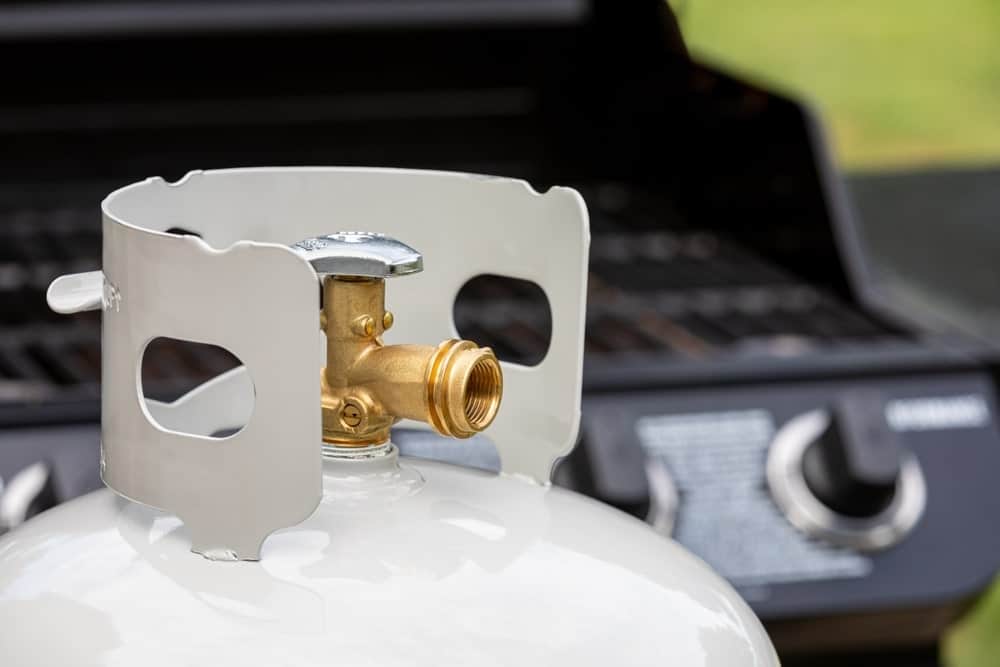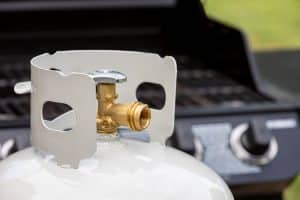Home > Energy Plans > What Is LPG?
What Is LPG?
Find out all about the LPG which powers your BBQ or caravan cooking here with Savvy.
Author
Savvy Editorial TeamFact checked

In Australia white LPG gas bottles fuel hundreds of thousands of BBQs each year. But have you ever wondered what exactly LPG is, and where it comes from? Is it the same as natural gas? Find the answer to these and many other questions about LPG right here with Savvy.
What is LPG, and where does it come from?
Liquefied petroleum gas (LPG) is the liquid form of a mixture of propane and butane gas, which is produced during the oil refining process. Once it has been extracted from deep underground, it is stored under pressure to keep it in its liquid form. Once that pressure is released, it returns to its gas vapour form.
LPG can be used for a wide range of heating and cooking purposes, but it can also power vehicles. With its clean-burning properties, LPG is considered an environmentally friendly alternative to traditional fossil fuels such as coal. This is because LPG is a low-carbon, low-sulphur fuel which results in less carbon dioxide emissions than burning coal or other types of gas.
Most Aussies are familiar with LPG from their small BBQ gas bottle, although it is also commonly supplied in larger tanks or cylinders to households who are not connected to piped natural gas, or for use in caravans. It is also extensively used in an industrial context to power kilns, ovens, steam boilers and LPG-powered forklifts.
Is LPG the same as natural gas?
LPG is not the same as natural gas, which is mostly methane. However, many cooking appliances which are designed to be used with piped natural gas can also be used with LPG. To store and transport LPG, it is pressurised and transported in gas cylinders or tanks. These are the same type of pressurised gas tanks which are used in vehicles which have been converted to run on LPG.
On the other hand, to store and transport natural gas (methane) it is cooled down to minus 162 degrees Celsius, at which temperature it turns into a liquid in a process known as liquefaction. This liquid form of natural gas is known as LNG, and has a volume 1/600th of its gas form. This reduction in volume allows natural gas to be transported in specially designed LNG tankers which take Australian natural gas all over the world.
Why does LPG gas smell so bad?
Both propane and butane gas are said to be odorless gasses – so why does it smell so bad when BBQ gas bottles are being refilled? The reason is that a bad-smelling substance is added to gas as a safety measure to alert people to a gas leak.
A substance called ethyl mercaptan (or ethanethiol, CH3CH2SH) is mixed in with the propane gas when it is bottled. This substance is said to be one of the worst-smelling substances in the world. However, how you perceive the smell differs between people, depending on your olfactory senses, or how your nose works. Some people describe it as like rotten eggs or rotten cabbage. Others perceive it to be like garlic, or the smell of a skunk. However you describe it, the ‘bad smell’ of gas is a warning that you need to take action. Don’t ignore it, as gas is highly flammable and can lead to an explosion.
What should I do if I smell gas in my home or caravan?
One of the reasons that ethyl mercaptan is added to both LPG and natural gas is that most people can smell this substance in very low concentrations, less than 25 parts per million. Dogs can detect it in even lower concentrations. For this reason, it is an effective early warning signal that gas is present in the atmosphere. If you smell gas, here’s what you should do:
- If you are in an enclosed space, immediately turn off all appliances and pilot lights and any other potential sources of ignition.
- Turn off the gas at its source if possible. This will usually involve closing the valve on the gas bottle.
- Get out of the enclosed space immediately, and make sure everyone else in the area evacuates too.
- Once the gas source has been shut off, ventilate the enclosed space by opening all doors and windows.
- Do not return into your home or caravan until all the smell of gas has gone.
What should I do if I smell gas outdoors?
If you smell gas in the street or outdoors, call 1800 GAS LEAK (1800 427 532) to report the leakage to the Australian Gas Network. The emergency operator you are connected to will give you instructions on what to do next.
How do I know how much gas is left in my BBQ gas bottle?
There's various ways to work out how much gas you have left in your BBQ gas bottle. A simple shake of the bottle will give you some indication, as if there is gas remaining, you’ll hear liquid sloshing sounds.
The hot water test method
- Get a cup or kettle containing hot but not boiling water. The water should be quite warm to the touch.
- Carefully pour the hot water down the side of the gas bottle. Start from the top and pour it gently down the side of the cylinder.
- Use your hand to feel the surface of the gas bottle as you pour the water.
- The level where the bottle starts feeling cold to the touch indicates the gas level in the bottle
Remember that this method is not very precise, and only provides a rough estimation of the gas level. It's always a good idea to have a spare gas bottle on hand to avoid running out of gas during your BBQ.
Weighing method
Most BBQ gas bottles have their empty weight and their total weight when full of gas stamped on them. If you have access to a set of scales, subtract the empty weight from the current weight of the bottle. The resulting weight will give you an estimate of how much gas is remaining.
For example, a standard 9kg BBQ gas bottle contains 9kg of LPG when it is filled to capacity. However, the empty weight of the gas bottle may be in the region of between 7.2kg and 10.8kg. Therefore, when it is filled with 9kg of liquid gas it will weigh between 16.2 and 19.8kg.
Gas level indicators
A gas level indicator is a magnetic strip that attaches to the side of the metal gas bottle and provides a visual indication of the gas level. They work by detecting the temperate difference between where the cold gas is and the empty cylinder temperature. Gas level indicators are inexpensive ($2 – $5) and available to buy online or at your favourite hardware store.
Gas bottle gauge
Some gas bottles come with gauges that display the approximate gas level. These gauges typically have markings indicating full, half, or empty, allowing you to gauge the amount of gas remaining. These gauges can also be fitted to an empty BBQ gas bottle before refilling, and are available for purchase from hardware stores and online for around $20 – $35.
Helpful energy guides
Compare energy plans
Disclaimer:
Savvy is partnered with Econnex Comparison (CIMET Sales Pty Ltd, ABN 72 620 395 726) to provide readers with a variety of energy plans to compare. We do not compare all retailers in the market, or all plans offered by all retailers. Savvy earns a commission from Econnex each time a customer buys an energy plan via our website. We don’t arrange for products to be purchased directly, as all purchases are conducted via Econnex.
Any advice presented above is general in nature and doesn’t consider your personal or business objectives, needs or finances. It’s always important to consider whether advice is suitable for you before purchasing an energy plan. For further information on the variety of energy plans compared by Econnex, or how their business works, you can visit their website.










